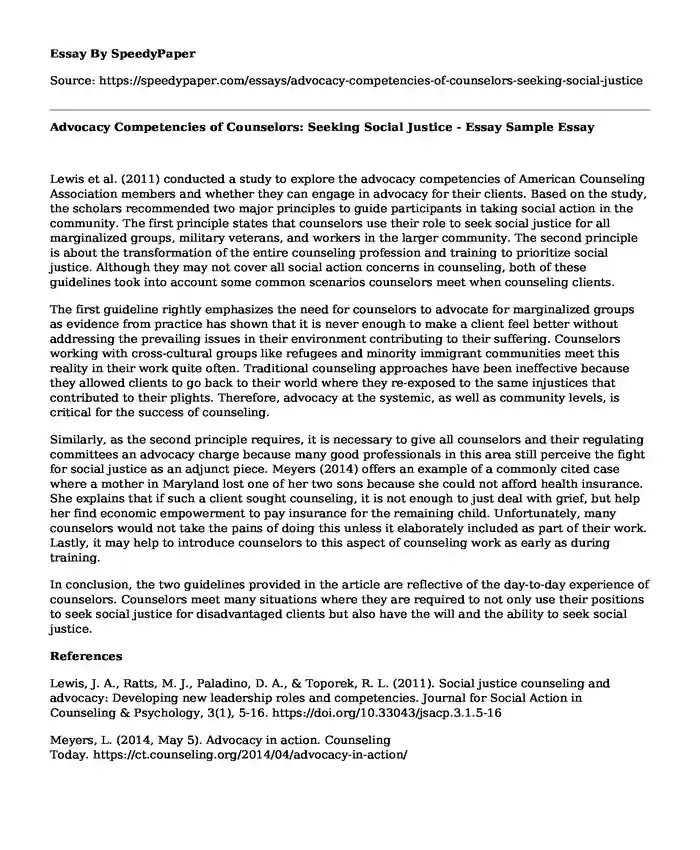
| Type of paper: | Essay |
| Categories: | Justice Social justice |
| Pages: | 2 |
| Wordcount: | 472 words |
Lewis et al. (2011) conducted a study to explore the advocacy competencies of American Counseling Association members and whether they can engage in advocacy for their clients. Based on the study, the scholars recommended two major principles to guide participants in taking social action in the community. The first principle states that counselors use their role to seek social justice for all marginalized groups, military veterans, and workers in the larger community. The second principle is about the transformation of the entire counseling profession and training to prioritize social justice. Although they may not cover all social action concerns in counseling, both of these guidelines took into account some common scenarios counselors meet when counseling clients.
The first guideline rightly emphasizes the need for counselors to advocate for marginalized groups as evidence from practice has shown that it is never enough to make a client feel better without addressing the prevailing issues in their environment contributing to their suffering. Counselors working with cross-cultural groups like refugees and minority immigrant communities meet this reality in their work quite often. Traditional counseling approaches have been ineffective because they allowed clients to go back to their world where they re-exposed to the same injustices that contributed to their plights. Therefore, advocacy at the systemic, as well as community levels, is critical for the success of counseling.
Similarly, as the second principle requires, it is necessary to give all counselors and their regulating committees an advocacy charge because many good professionals in this area still perceive the fight for social justice as an adjunct piece. Meyers (2014) offers an example of a commonly cited case where a mother in Maryland lost one of her two sons because she could not afford health insurance. She explains that if such a client sought counseling, it is not enough to just deal with grief, but help her find economic empowerment to pay insurance for the remaining child. Unfortunately, many counselors would not take the pains of doing this unless it elaborately included as part of their work. Lastly, it may help to introduce counselors to this aspect of counseling work as early as during training.
In conclusion, the two guidelines provided in the article are reflective of the day-to-day experience of counselors. Counselors meet many situations where they are required to not only use their positions to seek social justice for disadvantaged clients but also have the will and the ability to seek social justice.
References
Lewis, J. A., Ratts, M. J., Paladino, D. A., & Toporek, R. L. (2011). Social justice counseling and advocacy: Developing new leadership roles and competencies. Journal for Social Action in Counseling & Psychology, 3(1), 5-16. https://doi.org/10.33043/jsacp.3.1.5-16
Meyers, L. (2014, May 5). Advocacy in action. Counseling Today. https://ct.counseling.org/2014/04/advocacy-in-action/
Cite this page
Advocacy Competencies of Counselors: Seeking Social Justice - Essay Sample. (2023, Oct 27). Retrieved from https://speedypaper.com/essays/advocacy-competencies-of-counselors-seeking-social-justice
Request Removal
If you are the original author of this essay and no longer wish to have it published on the SpeedyPaper website, please click below to request its removal:
- Generational Justice Essay Example
- Free Essay Example on Missing Women in Aboriginal Canadian
- Free Essay on Research Methods in Criminal Justice and Criminology
- Free Essay Example: Descriptive Statistics in Criminal Justice
- Essay Sample on Description and Background of the Case
- Essay Sample on Drugs and Victimization
- Essay Sample on Definitions and Conceptualizations of Crime
Popular categories




